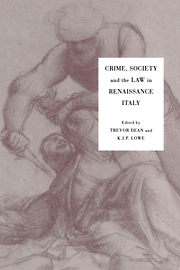Book contents
- Frontmatter
- Contents
- Illustrations
- List of contributors
- Preface
- 1 Writing the history of crime in the Italian Renaissance
- 2 Criminal justice in mid-fifteenth-century Bologna
- 3 The judicial system in Florence in the fourteenth and fifteenth centuries
- 4 The incidence of crime in Sicily in the mid fifteenth century: the evidence from composition records
- 5 Theology, nature and the law: sexual sin and sexual crime in Italy from the fourteenth to the seventeenth century
- 6 Practical problems in the enforcement of Italian sumptuary law, 1200–1500
- 7 The prince, the judges and the law: Cosimo I and sexual violence, 1558
- 8 Intervention by church and state in marriage disputes in sixteenth- and seventeenth-century Florence
- 9 The writer and the man. Real crimes and mitigating circumstances: il caso Cellini
- 10 The political crime of conspiracy in fifteenth- and sixteenth-century Rome
- 11 Fighting or flyting? Verbal duelling in mid-sixteenth-century Italy
- 12 Banditry and lawlessness on the Venetian Terraferma in the later Cinquecento
- 13 Mihi vindictam: aristocratic clans and rural communities in a feud in Friuli in the late fifteenth and early sixteenth centuries
- Index
8 - Intervention by church and state in marriage disputes in sixteenth- and seventeenth-century Florence
Published online by Cambridge University Press: 14 October 2009
- Frontmatter
- Contents
- Illustrations
- List of contributors
- Preface
- 1 Writing the history of crime in the Italian Renaissance
- 2 Criminal justice in mid-fifteenth-century Bologna
- 3 The judicial system in Florence in the fourteenth and fifteenth centuries
- 4 The incidence of crime in Sicily in the mid fifteenth century: the evidence from composition records
- 5 Theology, nature and the law: sexual sin and sexual crime in Italy from the fourteenth to the seventeenth century
- 6 Practical problems in the enforcement of Italian sumptuary law, 1200–1500
- 7 The prince, the judges and the law: Cosimo I and sexual violence, 1558
- 8 Intervention by church and state in marriage disputes in sixteenth- and seventeenth-century Florence
- 9 The writer and the man. Real crimes and mitigating circumstances: il caso Cellini
- 10 The political crime of conspiracy in fifteenth- and sixteenth-century Rome
- 11 Fighting or flyting? Verbal duelling in mid-sixteenth-century Italy
- 12 Banditry and lawlessness on the Venetian Terraferma in the later Cinquecento
- 13 Mihi vindictam: aristocratic clans and rural communities in a feud in Friuli in the late fifteenth and early sixteenth centuries
- Index
Summary
According to medieval Christian doctrine, matrimony, besides being the instrument of procreation and a remedy for fornication, was an alliance aimed at pacifying and reconciling families, factions and princes. Marriage as a guarantee of social stability had ancient roots – so much so that the church had always sought to control clandestine marriages, albeit by means which proved totally inadequate. More recent was the claim by secular authorities to interfere in a field exclusively controlled by the church, as marriage had been, since at least the twelfth century. The process of establishing a claim and then interfering was a long one. In the sixteenth century it was in the Protestant countries that the first attack by secular authorities was launched against the ecclesiastical monopoly on marriage law. Towards the end of the eighteenth century, even in Catholic countries, the monarchs arrogated to themselves the power to regulate the subject of matrimony and in particular to decide upon impediments: that is, to declare some types of marriage invalid, such as those contracted without parental consent. We find intermediate stages in the early sixteenth century, in the threat of punishment such as disinheritance for those who contracted marriage clandestinely, and in more indirect forms of control such as the regulation of the crime of non-violent rape, which I shall discuss further on.
- Type
- Chapter
- Information
- Crime, Society and the Law in Renaissance Italy , pp. 142 - 156Publisher: Cambridge University PressPrint publication year: 1994
- 1
- Cited by



